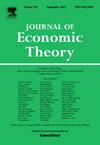Discrete/continuous choice models and representative consumer theory
IF 1.2
3区 经济学
Q3 ECONOMICS
引用次数: 0
Abstract
We establish the integrability of demand for a broad class of discrete/continuous choice, additive, homothetic random-utility models of individual consumer behavior with perfect substitutes preferences (linear indifference curves) and divisible goods. We derive the corresponding indirect utility function and then establish a representative consumer formulation for this entire class of models. The representative consumer is always normative, facilitating aggregate welfare analysis. These findings should be of interest to the literature in macro, trade, industrial organization, labor, and ideal price index measurement that use representative consumer models, such as CES and its variants. Our results generalize such representative consumer formulations to the broad, empirically-relevant class of models of behavior that are routinely used in the discrete/continuous choice analysis of micro data, including specifications that do not suffer from the IIA property and that allow for heterogeneous consumer preferences and incomes. These flexible discrete/continuous choice formulations also overcome many of the known limitations of CES and its variants for equilibrium prices and markups, trade liberalization effects and welfare analysis. We also discuss quasi-linear integrability in the case where products are indivisible and integrability no longer holds. If we relax homotheticity, we find that integrability generically fails to hold except in the special case of IIA preferences.
离散/连续选择模型和代表性消费者理论
我们建立了一大类具有完全替代偏好(线性无差异曲线)和可分商品的个人消费者行为的离散/连续选择、加性、同质随机效用模型的需求可积性。我们推导了相应的间接效用函数,然后为这类模型建立了一个具有代表性的消费者公式。代表性消费者总是规范性的,有利于总福利分析。这些发现应该对宏观、贸易、产业组织、劳动力和使用代表性消费者模型(如CES及其变体)的理想价格指数测量方面的文献感兴趣。我们的研究结果将这些具有代表性的消费者公式推广到广泛的、与经验相关的行为模型类别,这些模型通常用于微观数据的离散/连续选择分析,包括不受IIA属性影响的规范,以及允许异质性消费者偏好和收入的规范。这些灵活的离散/连续选择公式也克服了CES及其变体在均衡价格和加价、贸易自由化影响和福利分析方面的许多已知限制。我们还讨论了在乘积不可分且可积性不再成立的情况下的拟线性可积性。如果我们放宽同性,我们发现除了在IIA偏好的特殊情况下,一般的可积性不成立。
本文章由计算机程序翻译,如有差异,请以英文原文为准。
求助全文
约1分钟内获得全文
求助全文
来源期刊

Journal of Economic Theory
ECONOMICS-
CiteScore
2.50
自引率
12.50%
发文量
135
期刊介绍:
The Journal of Economic Theory publishes original research on economic theory and emphasizes the theoretical analysis of economic models, including the study of related mathematical techniques. JET is the leading journal in economic theory. It is also one of nine core journals in all of economics. Among these journals, the Journal of Economic Theory ranks fourth in impact-adjusted citations.
 求助内容:
求助内容: 应助结果提醒方式:
应助结果提醒方式:


